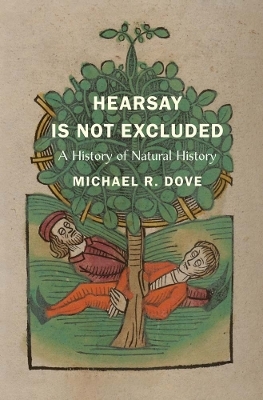
Hearsay Is Not Excluded
A History of Natural History
Seiten
2024
Yale University Press (Verlag)
978-0-300-27367-0 (ISBN)
Yale University Press (Verlag)
978-0-300-27367-0 (ISBN)
- Titel z.Zt. nicht lieferbar
- Versandkostenfrei innerhalb Deutschlands
- Auch auf Rechnung
- Verfügbarkeit in der Filiale vor Ort prüfen
- Artikel merken
This chronicle of natural history argues that the modern environmental crisis and rise in science skepticism codeveloped with the historic distancing of scientific knowledge from folk knowledge
For millennia, the field of natural history promoted a knowledgeable and unifying view of the world. In contrast, the modern rise of narrow scientific disciplines has promoted a dichotomy between nature and culture on the one hand and between scientific and folk knowledge on the other. Drawing on the fields of anthropology, history, and environmental science, Michael R. Dove argues that the loss of this historic holistic vision of the world is partly to blame for contemporary environmental degradation and science skepticism.
Dove bases this thesis on a study of four pioneering natural historians across four centuries: Georg Eberhard Rumphius (seventeenth century), Carl Linnaeus (eighteenth century), Alfred Russel Wallace (nineteenth century), and Harold C. Conklin (twentieth century). Dove studies their field craft and writing; the political, cultural, and environmental circumstances in which they worked; the sources of their insight; and the implications of their work for modern society. Most of all, the book seeks to discover what enabled those natural historians to straddle boundaries that today seem impassable and to distill that wisdom for a modern world greatly in need of a holistic vision of people and environment.
For millennia, the field of natural history promoted a knowledgeable and unifying view of the world. In contrast, the modern rise of narrow scientific disciplines has promoted a dichotomy between nature and culture on the one hand and between scientific and folk knowledge on the other. Drawing on the fields of anthropology, history, and environmental science, Michael R. Dove argues that the loss of this historic holistic vision of the world is partly to blame for contemporary environmental degradation and science skepticism.
Dove bases this thesis on a study of four pioneering natural historians across four centuries: Georg Eberhard Rumphius (seventeenth century), Carl Linnaeus (eighteenth century), Alfred Russel Wallace (nineteenth century), and Harold C. Conklin (twentieth century). Dove studies their field craft and writing; the political, cultural, and environmental circumstances in which they worked; the sources of their insight; and the implications of their work for modern society. Most of all, the book seeks to discover what enabled those natural historians to straddle boundaries that today seem impassable and to distill that wisdom for a modern world greatly in need of a holistic vision of people and environment.
Michael R. Dove is the Margaret K. Musser Professor of Social Ecology and professor and curator of anthropology at Yale University, and author of Bitter Shade: The Ecological Challenge of Human Consciousness. He has carried out decades of field research in Asia and now lives in Killingworth, CT.
| Erscheinungsdatum | 20.12.2023 |
|---|---|
| Reihe/Serie | Yale Agrarian Studies Series |
| Zusatzinfo | 25 b-w illus. |
| Sprache | englisch |
| Maße | 156 x 235 mm |
| Themenwelt | Naturwissenschaften ► Biologie ► Ökologie / Naturschutz |
| Technik ► Umwelttechnik / Biotechnologie | |
| ISBN-10 | 0-300-27367-3 / 0300273673 |
| ISBN-13 | 978-0-300-27367-0 / 9780300273670 |
| Zustand | Neuware |
| Haben Sie eine Frage zum Produkt? |
Mehr entdecken
aus dem Bereich
aus dem Bereich


